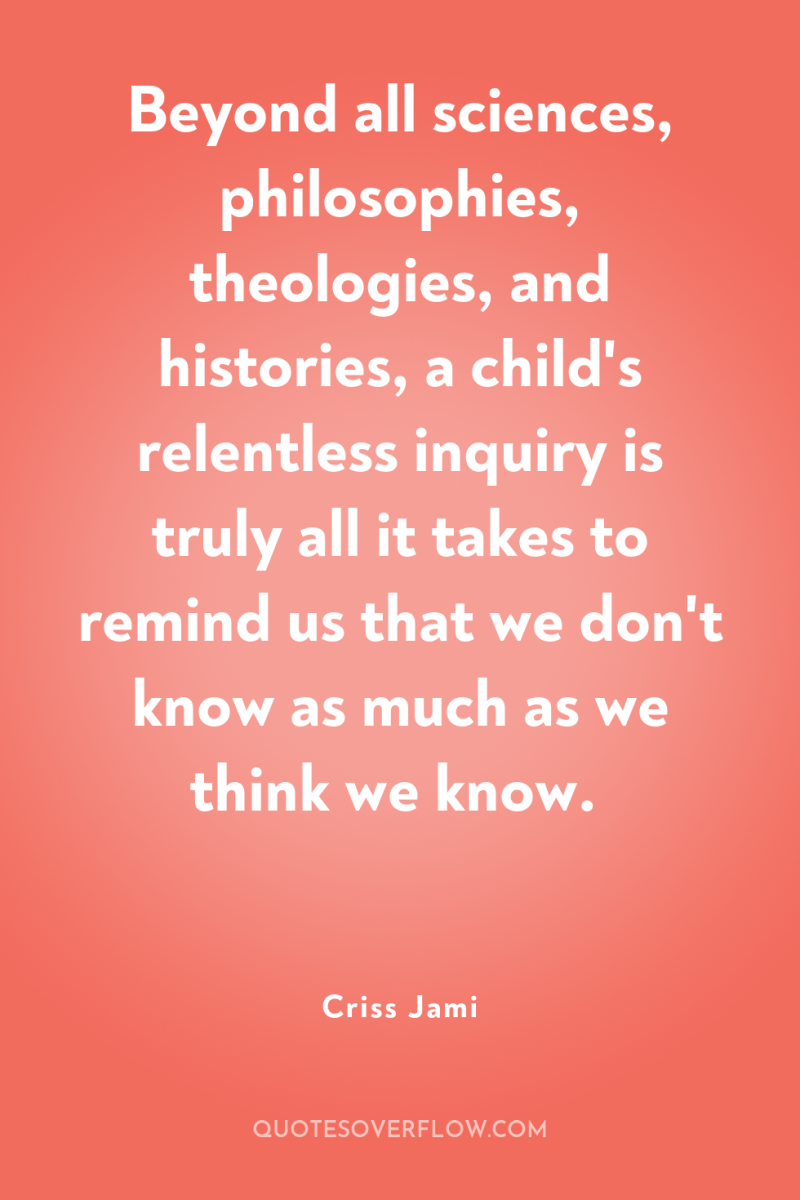
1
Beyond all sciences, philosophies, theologies, and histories, a child's relentless inquiry is truly all it takes to remind us that we don't know as much as we think we know.Criss Jami
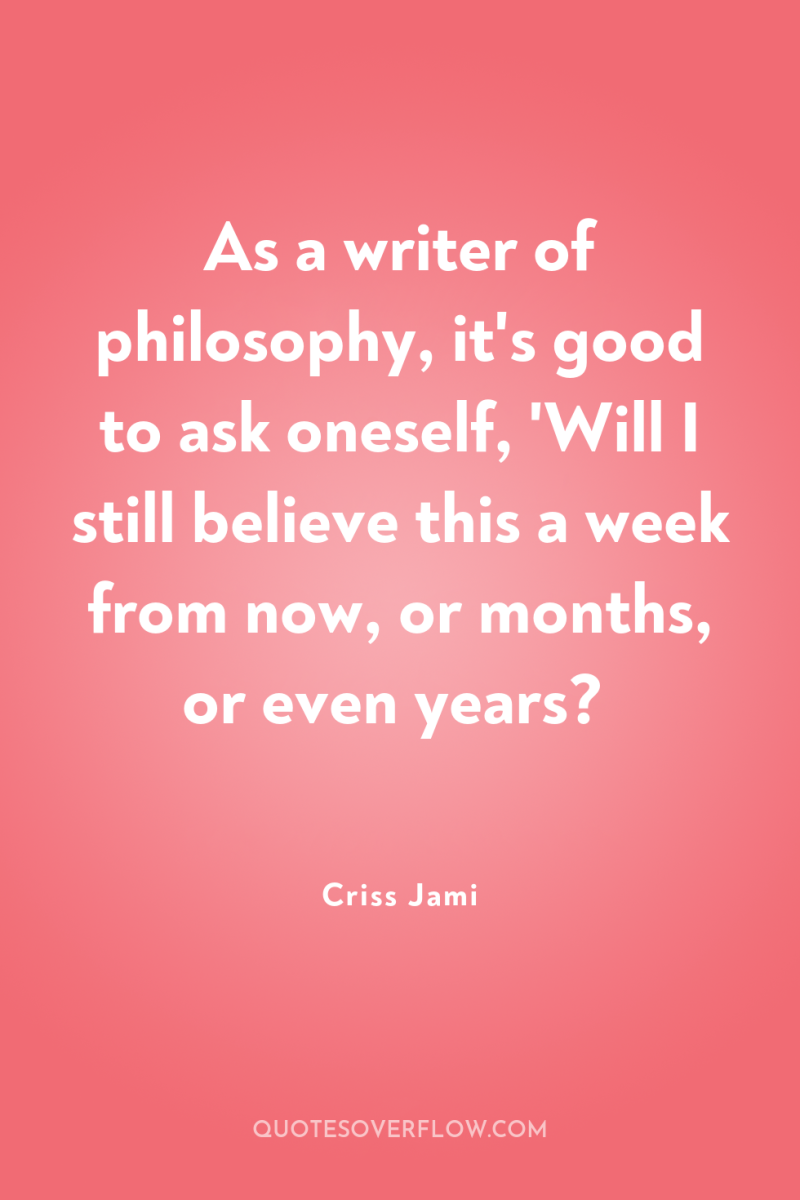
2
As a writer of philosophy, it's good to ask oneself, 'Will I still believe this a week from now, or months, or even years?Criss Jami
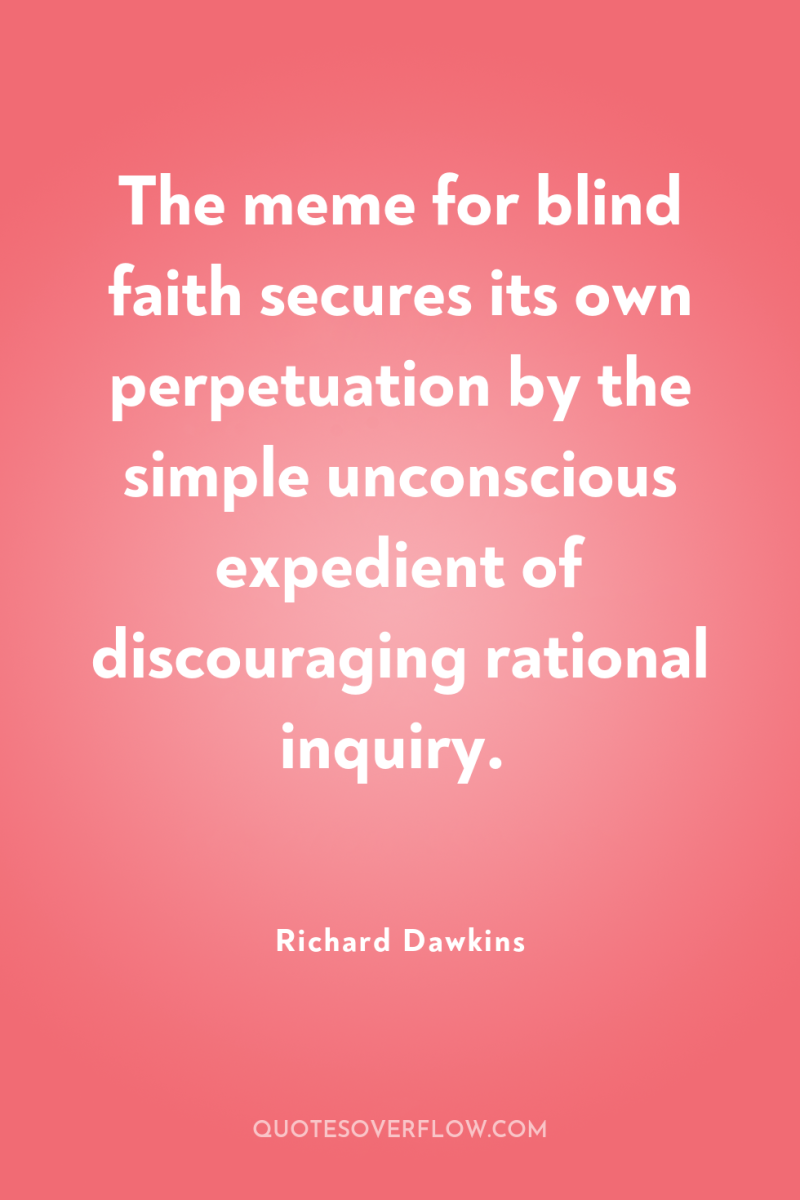
3
The meme for blind faith secures its own perpetuation by the simple unconscious expedient of discouraging rational inquiry.Richard Dawkins
4
If the whole universe can be found in our own body and mind, this is where we need to make our inquires. We all have the answers within ourselves, we just have not got in touch with them yet. The potential of finding the truth within requires faith in ourselves.Ayya Khema

5
A good education must expose knowledge gaps and increase the hunger for further inquiries. A good education is not complete.Magnus Nwagu Amudi
6
The inquiry of truth, which is the love-making, or the wooing of it, the knowledge of truth, which is the presence of it, and the belief of truth, which is the enjoying of it, is the sovereign good of human nature.Francis Bacon
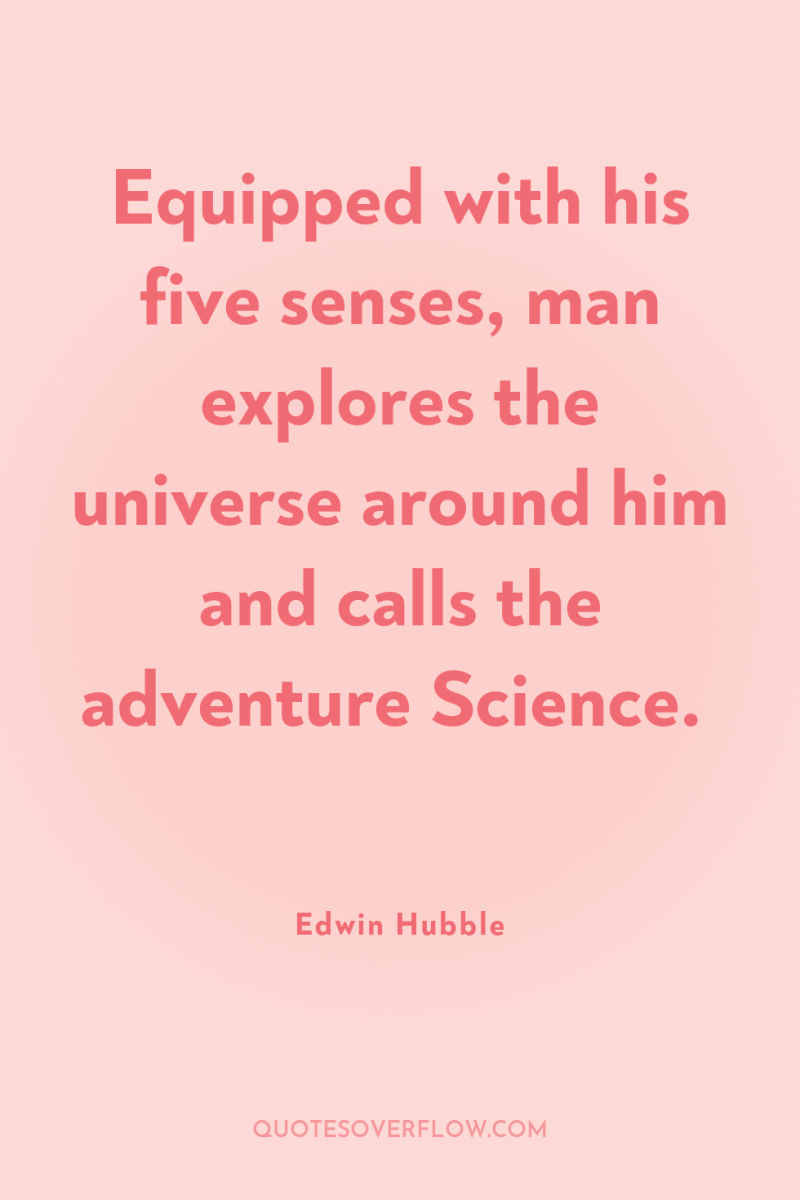
7
Equipped with his five senses, man explores the universe around him and calls the adventure Science.Edwin Hubble
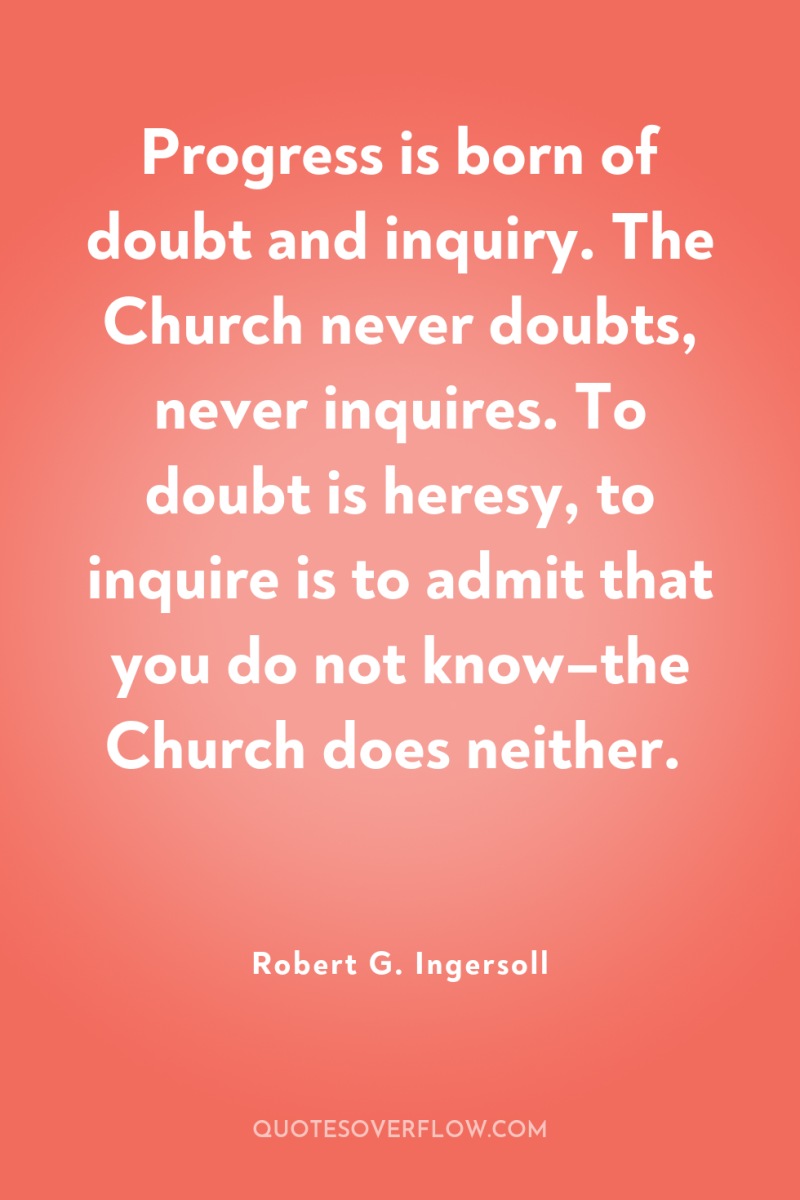
8
Progress is born of doubt and inquiry. The Church never doubts, never inquires. To doubt is heresy, to inquire is to admit that you do not know–the Church does neither.Robert G. Ingersoll

9
In changing times, question everything you take for granted.Gyan Nagpal
10
Rather than swallowing our pride and simply asking what we do not know, we choose to fill in the blanks ourselves and later become humbled. Wisdom was often, in its youth, proven foolish, and ones humiliated were meant to become wise.Criss Jami
11
In like manner, if I let myself believe anything on insufficient evidence, there may be no great harm done by the mere belief; it may be true after all, or I may never have occasion to exhibit it in outward acts. But I cannot help doing this great wrong towards Man, that I make myself credulous. The danger to society is not merely that it should believe wrong things, though that is great enough; but that it should become credulous, and lose the habit of testing things and inquiring into them; for then it must sink back into savagery.William Kingdon Clifford
12
Many of the innovations in science and philosophy have come from unbelievers, some of whom died for their 'unbeliefs.' Without unbelief, we might well be living in the Dark Ages or at least in the intellectual equivalent of that time. In past centuries many theists savagely attacked atheists on the ground that someone without a belief in God must be a moral 'monster, ' who would permit any action. This argument is rarely heard today, as the number of people who are openly atheists has become so large that its falsity is self-evident. Atheists do have a moral code to guide them. It is usually based upon the Golden Rule, plus a variety of utilitarian reasons, although there are a number of other possible systems. Rather than being immoral, most atheists are extremely moral. There are a large number of people who can and do manage to lead decent upright lives with no use for a belief in God as a guide. Atheists do not care whether others believe as they do. They do ask, however, for the right to believe as they wish. .Gordon Stein
13
If you tell somebody something, you've forever robbed them of the opportunity to discover it for themselves.Curt Gabrielson
14
There is no way to help a learner to be disciplined, active, and thoroughly engaged unless he perceives a problem to be a problem or whatever is to-be-learned as worth learning, and unless he plays an active role in determining the process of solution.Neil Postman
15
But in introducing me simultaneously to skepticism and to wonder, they taught me the two uneasily cohabiting modes of thought that are central to the scientific method.Carl Sagan
16
Every great man is an idol, an oracle of inquiry. Don't aspire to know the former, but aspire to know the diety in his soul.Michael Bassey Johnson
17
Just as we may, through an appalled realization that we were unaware of what was going on in the mind of one we thought we knew, come to wonder how we ever know what another person is thinking or feeling, so too we may, having on some occasion wanted badly to understand and having clearly failed, come to wonder how we ever manage to understand, and how we know that we have succeeded.Patrick Wilson
18
Tsze-kung wished to dispense with the sacrifice of a sheep for the New Moon ceremony. The Master said, "You love the sheep; I love the ceremony.Confucius
19
In an honest effort to gain understanding, asking questions do not, necessarily, imply a conclusion has been determined. They can be used to avoid making the wrong judgement. If building trust is the ultimate goal - there is no need to be defensive, or feel threatened by any inquiry.T.F. Hodge
20
Religion, by its very nature as an untestable belief in undetectable beings and an unknowable afterlife, disables our reality checks. It ends the conversation. It cuts off inquiry: not only factual inquiry, but moral inquiry. Because God's law trumps human law, people who think they're obeying God can easily get cut off from their own moral instincts. And these moral contortions don't always lie in the realm of theological game-playing. They can have real-world consequences: from genocide to infanticide, from honor killings to abandoned gay children, from burned witches to battered wives to blown-up buildings.Greta Christina
21
Atheism is the default position in any scientific inquiry, just as a-quarkism or a-neutrinoism was. That is, any entity has to earn its admission into a scientific account either via direct evidence for its existence or because it plays some fundamental explanatory role. Before the theoretical need for neutrinos was appreciated (to preserve the conservation of energy) and then later experimental detection was made, they were not part of the accepted physical account of the world. To say physicists in 1900 were 'agnostic' about neutrinos sounds wrong: they just did not believe there were such things. As yet, there is no direct experimental evidence of a deity, and in order for the postulation of a deity to play an explanatory role there would have to be a lot of detail about how it would act. If, as you have suggested, we are not “good judges of how the deity would behave, ” then such an unknown and unpredictable deity cannot provide good explanatory grounds for any phenomenon. The problem with the 'minimal view' is that in trying to be as vague as possible about the nature and motivation of the deity, the hypothesis loses any explanatory force, and so cannot be admitted on scientific grounds. Of course, as the example of quarks and neutrinos shows, scientific accounts change in response to new data and new theory. The default position can be overcome.Tim Maudlin
22
The atheist, agnostic, or secularist. . should guard against the encroachment of religion in areas where it has no place, and in particular the control of education by religious authority. The attempts to ban the teaching of evolution or other scientific theories -- a feeble echo of medieval church tyranny and hostility to learning, but an echo nonetheless are serious threats to freedom of inquiry and should be vigorously combated.S.T. Joshi
23
A grand and almost untrodden field of inquiry will be opened, on the causes and laws of variation, on correlation of growth, on the effects of use and disuse, on the direct actions of external conditions, and so forth.Charles Darwin
24
The practice of deep listening is the practice of open inquiry, without assumption or judgement.Sharon Weil
25
...You know something, don't you?"" I know lots of things--your inquiry needs to be more specific."" Just answer the question."" True/false or multiple choice?Neal Shusterman
26
Reason and free inquiry are the only effectual agents against error.Thomas Jefferson
27
The determination of the average man is not merely a matter of speculative curiosity; it may be of the most important service to the science of man and the social system. It ought necessarily to precede every other inquiry into social physics, since it is, as it were, the basis. The average man, indeed, is in a nation what the centre of gravity is in a body; it is by having that central point in view that we arrive at the apprehension of all the phenomena of equilibrium and motion.Adolphe Quetelet
28
The merits and services of Christianity have been industriously extolled by its hired advocates. Every Sunday its praises are sounded from myriads of pulpits. It enjoys the prestige of an ancient establishment and the comprehensive support of the State. It has the ear of rulers and the control of education. Every generation is suborned in its favor. Those who dissent from it are losers, those who oppose it are ostracised; while in the past, for century after century, it has replied to criticism with imprisonment, and to scepticism with the dungeon and the stake. By such means it has induced a general tendency to allow its pretensions without inquiry and its beneficence without proof. .Joseph Mazzini Wheeler
29
The scientist has a lot of experience with ignorance and doubt and uncertainty, and this experience is of very great importance, I think. When a scientist doesn’t know the answer to a problem, he is ignorant. When he has a hunch as to what the result is, he is uncertain. And when he is pretty damn sure of what the result is going to be, he is still in some doubt. We have found it of paramount importance that in order to progress, we must recognize our ignorance and leave room for doubt. Scientific knowledge is a body of statements of varying degrees of certainty – some most unsure, some nearly sure, but none absolutely certain. Now, we scientists are used to this, and we take it for granted that it is perfectly consistent to be unsure, that it is possible to live and not know. But I don’t know whether everyone realizes this is true. Our freedom to doubt was born out of a struggle against authority in the early days of science. It was a very deep and strong struggle: permit us to question – to doubt – to not be sure. I think that it is important that we do not forget this struggle and thus perhaps lose what we have gained.Richard Feynman
30
Unless the inquiry has been so exhaustive as to explore every possibility, the lack of evidence should never be used to ground a statement of fact. Unlikelihood certainly, but no more. A prematurely assumed fact blocks further inquiry.Jonathan Renshaw
31
Who now would thrust enquiry on / Beyond necessity of desire?Geoffrey Hill
32
He turned the presidency — and the President's House — into something it had not been before: a center of curiosity and inquiry, of vibrant institution that played informal but important roles in the broader life of the nation, from science to literature.Jon Meacham
33
Writing seems to free them (students) of the idea that math is a collection of right answers own by the teacher — a body of knowledge that she will dispense in chunks and that they have to swallow and digest.John Countryman
34
Who am I? The great inquiry indeed.Yogananda Paramhansa
35
There was yet another disadvantage attaching to the whole of Newton’s physical inquiries, .. the want of an appropriate notation for expressing the conditions of a dynamical problem, and the general principles by which its solution must be obtained. By the labours of LaGrange, the motions of a disturbed planet are reduced with all their complication and variety to a purely mathematical question. It then ceases to be a physical problem; the disturbed and disturbing planet are alike vanished: the ideas of time and force are at an end; the very elements of the orbit have disappeared, or only exist as arbitrary characters in a mathematical formula. .George Boole
36
Good questions are to be appreciated, not answered.Raheel Farooq